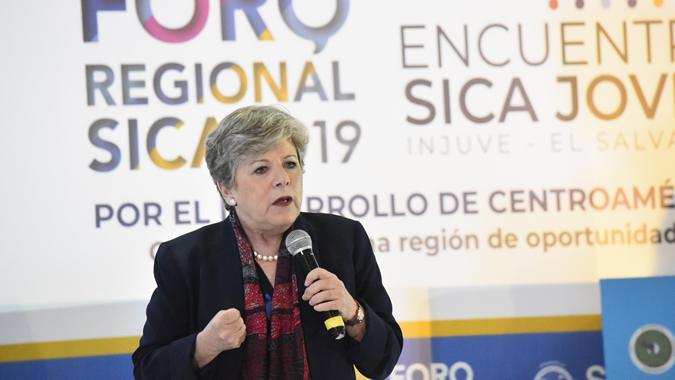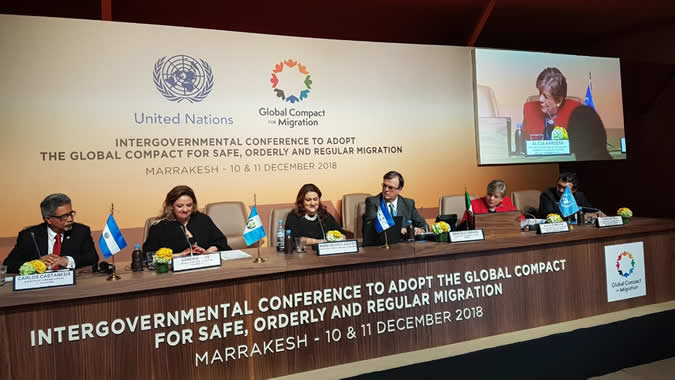Alicia Bárcena Stresses the Urgency of Transforming Privileges into Rights to Put an End to Inequality
Work area(s)
In the framework of the SICA Regional Forum 2019, ECLAC’s Executive Secretary delivered a keynote speech in which she sustained that inequality, poverty and migration are the basis of the widespread social disenchantment affecting the region.

The Executive Secretary of the Economic Commission for Latin America and the Caribbean (ECLAC), Alicia Bárcena, stressed the urgency of transforming privileges into rights to put an end to inequality, poverty and migration, which are the basis of social disenchantment in the region today, while she delivered a keynote speech in the framework of the Central American Integration System (SICA) Regional Forum 2019, which is taking place through Thursday, December 5 in El Salvador.
The senior United Nations official made a presentation entitled Regional Integration and Prospects for Central America’s Development, in which she highlighted the importance of implementing a new development model and finding new paths that allow countries to equalize to grow, and grow to equalize.
“How much longer can the culture of privilege, corruption and inequality last? The disenchantment and anger are at a breaking point with regard to continuing a model associated with three decades of concentration of wealth and environmental degradation, with insufficient growth. The development model we are living under has no legitimacy today and young people know this, that’s why they are in the streets demonstrating,” she said.
Alicia Bárcena emphasized that the culture of privilege, which is a legacy of our colonial past, naturalizes inequalities and discrimination, social hierarchies, political deliberation and access to justice.
“We have to fight the culture of privilege. The current model is no longer working, not in terms of growth, or reducing inequality, or eradicating poverty,” she indicated.
ECLAC’s most senior representative added that one of the most eloquent manifestations of the culture of privilege is tax evasion, which amounts to 6.3% of GDP in Latin America, equivalent to $335 billion dollars, whereas spending on non-contributory social protection programs represents just 1.47% of GDP.
Furthermore, she warned that 76.8% of people in Latin America live with income that is below the three poverty lines, and more than half of the adult population (52%) in the middle strata had not completed 12 years of schooling as of 2017.
In light of the complex regional and global context, ECLAC’s Executive Secretary stressed the need to deepen integration and she highlighted the Central American process as a sustained effort, which nonetheless faces new challenges.
“Integration matters, very much. The Central American subregion should be proud of what it has achieved. Efforts have been made to preserve unity over two centuries. Central America is the most integrated subregion of Latin America and the Caribbean,” she stated.
Alicia Bárcena specified that, while Central America’s economy will grow 2.5% in 2019, poverty and extreme poverty have been increasing in the last few years, a trend that is expected to intensify in 2019. This goes hand in hand with rising unemployment rates that mainly affect young people in the subregion.
“In Central America, more than 600,000 young people are seeking to enter the labor market and only about 250,000 new formal jobs are being created. Given this reality, one of the options is to migrate. It is estimated that around 250,000 Central Americans emigrate from their countries. More than half of them are young people, some of whom are minors,” she warned.
In that sense, she highlighted the El Salvador, Guatemala, Honduras and Mexico Comprehensive Development Plan, which promotes comprehensive solutions for migration, sustainable development and for deepening regional cooperation.
Finally, ECLAC’s Executive Secretary called for building a shared space for sustainable development, improving integration in infrastructure, energy and logistics with a different development paradigm and model and with young people on board.
Related content

El Salvador, Guatemala, Honduras and Mexico Reaffirm their Commitment to the Comprehensive Development Plan
Representatives of the four governments convened a high-level meeting today at United Nations headquarters in New York to discuss the Plan and challenges to its implementation

Foreign Ministers of El Salvador, Guatemala, Honduras and Mexico Presented Comprehensive Development Plan in the Framework of the Conference on the Global Compact for Migration
The regional initiative will change the paradigm of migration, development and cooperation between northern Central America and Mexico, under ECLAC’s auspices.

CEPAL apoyará diseño e implementación de Plan de Desarrollo Integral impulsado por El Salvador, Guatemala, Honduras y México
Alicia Bárcena, Secretaria Ejecutiva del organismo regional, asistió hoy como testigo de honor a la firma de una declaración de desarrollo e inversión, suscrita por los cuatro países en Ciudad de…
Country(ies)
- Central America
- Latin America and the Caribbean
Contact
Public Information Unit
- prensa@cepal.org
- (56 2) 2210 2040